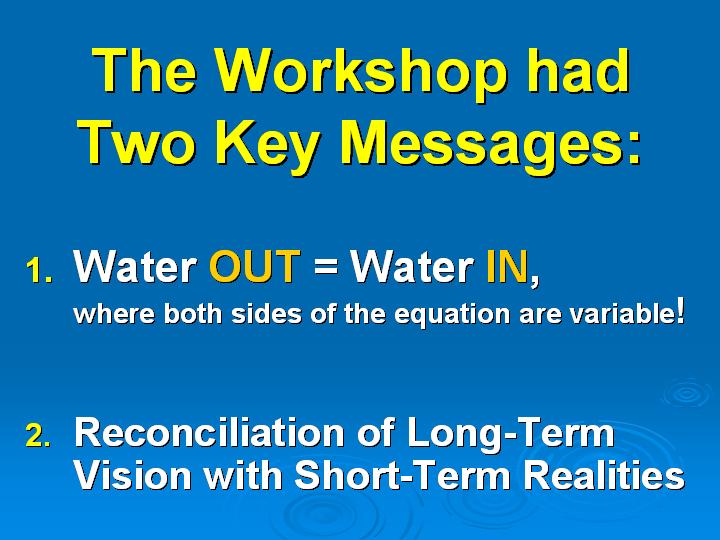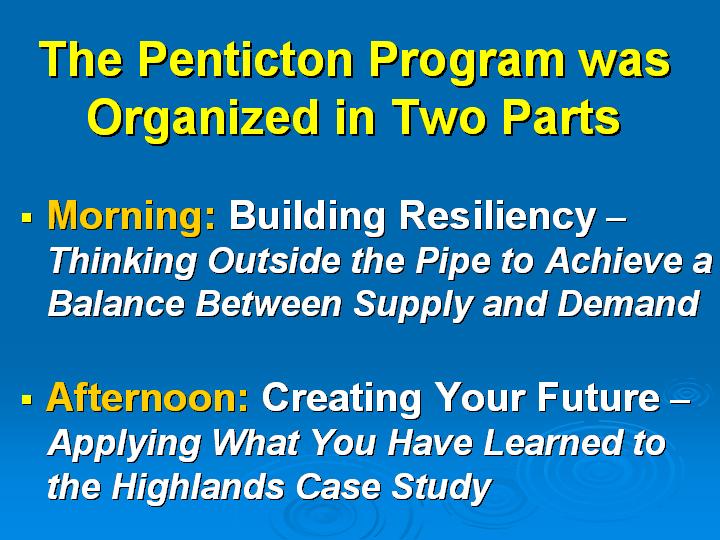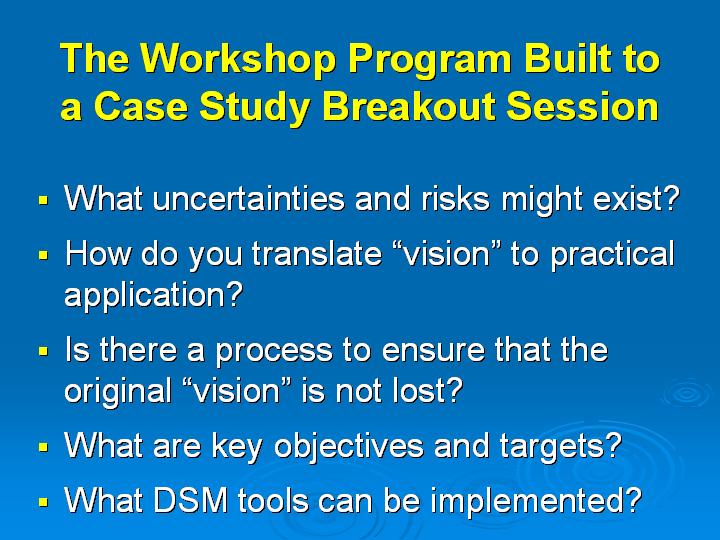FLASHBACK T0 2005: “People have no difficulty reconciling personal long-term and short-term decisions, yet are challenged when it comes to reconciling short-term political versus long-term community planning decisions,” stated Robert Hicks, Metro Vancouver Senior Engineer, at the Penticton Workshop that launched the Convening for Action in British Columbia initiative
Note to Reader:
The “Penticton Workshop” held as an adjunct to the BCWWA Annual Conference in April 2005 was the first regional event organized under the Convening for Action in British Columbia (CFA) umbrella, an element of the Water Sustainability Action Plan for British Columbia, released a year earlier in February 2004.
The workshop was titled “Demand Management Strategies – Achieving Water Balance” – A Workshop on Dealing with Uncertainty and Managing Risk.
This full-day technical transfer session connected the dots between water resource planning, climate variability and risk management; explored the tools and techniques available through demand-side management; and gave participants ‘hands-on’ planning practice to demonstrate how to achieve a water balance without relying on new sources and infrastructure. Below we feature the presentation by Robert Hicks, a workshop co-organizer.

Achieving a Water Balance
The workshop was a collaboration of the BCWWA Water Sustainability Committee (forerunner of the Partnership for Water Sustainability in BC), the former Land & Water British Columbia (LWBC) and the former Ministry of Water, Land & Air Protection. Wenda Mason of LWBC and Kim Stephens co-moderated the full-day event. Together with Robert Hicks, a Senior Engineer with the Greater Vancouver Regional District, this trio co-developed the program content over a period of many months.
To Learn More:
To download a copy of the comprehensive workshop program, click on “Demand Management Strategies – Achieving Water Balance” – A Workshop on Dealing with Uncertainty and Managing Risk.
To provide a record of the event for posterity, the Water Sustainability Action Plan steering committee published the Report on Water OUT = Water IN Workshop in mid-2005.
Know the Lingo!
 “Conventional water supply planning is typically based on a narrow understanding of engineering statistics without really understanding the role that climate variability plays. A core message is that the OUT = IN equation is variable on both sides. Something to think about is that in mathematics one cannot solve for two variables with a single equation. In other words, it is time for practitioners to go back to the basics and re-think how we approach water supply analysis and planning,” noted Robert Hicks in his workshop presentation.
“Conventional water supply planning is typically based on a narrow understanding of engineering statistics without really understanding the role that climate variability plays. A core message is that the OUT = IN equation is variable on both sides. Something to think about is that in mathematics one cannot solve for two variables with a single equation. In other words, it is time for practitioners to go back to the basics and re-think how we approach water supply analysis and planning,” noted Robert Hicks in his workshop presentation.
“A key message in my presentation revolved around the importance of lingo in communicating with decision-makers, and how messages can easily be lost in translation when language is not used effectively. A second key message related to a retirement planning way-of-thinking and the conundrum whereby people have no difficulty reconciling personal long-term and short-term decisions, yet are challenged when it comes to reconciling short-term political versus long-term community planning decisions.”
To Learn More:
To download the presentation by Robert Hicks, click on Reconciliation of Long-Term Visions with Short-Term Realities: Planning to Live Within Limits
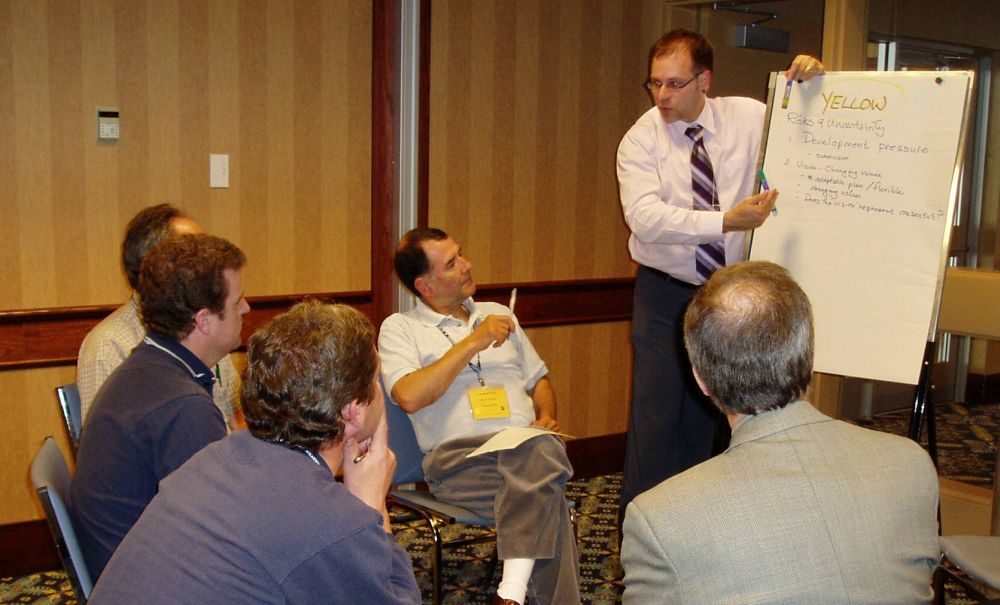
Breakout group led by Robert Hicks
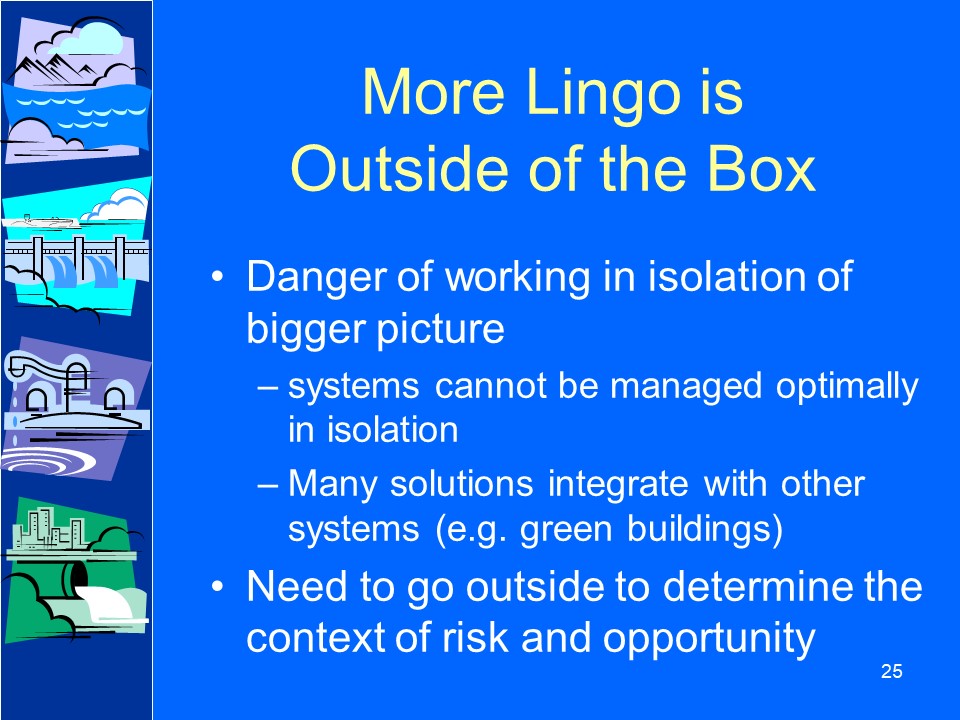
Building an Informed Community of Practice
“In British Columbia, school children learn about the water cycle in Grade Five. By high school they have forgotten about it. There is a parallel pattern in engineering education. The concept is re-taught in first year hydrology and then forgotten after graduation. These observations have provided an impetus for the Convening for Action in BC initiative to champion OUT = IN as the way to re-focus water supply planners,” stated Kim Stephens, Program Coordinator, Water Sustainability Action Plan for BC.
 “The workshop was an important first step in changing the way practitioners approach water supply planning. We introduced a number of key concepts that we intend to build upon:
“The workshop was an important first step in changing the way practitioners approach water supply planning. We introduced a number of key concepts that we intend to build upon:
- the water balance equation: Water OUT = Water IN
- reconciliation of long-term vision and short-term reality
- choice of language (“lingo”)
- retirement planning analogy
- water/energy nexus”
“Through the Convening for Action in British Columbia initiative, we are building a language and getting people involved. We are developing ideas and educating people. The bottom-line is that we are building an informed community of practice. Looking to the future, we envision that the workshop program will be the template for a training course and ultimately a guidebook.”
